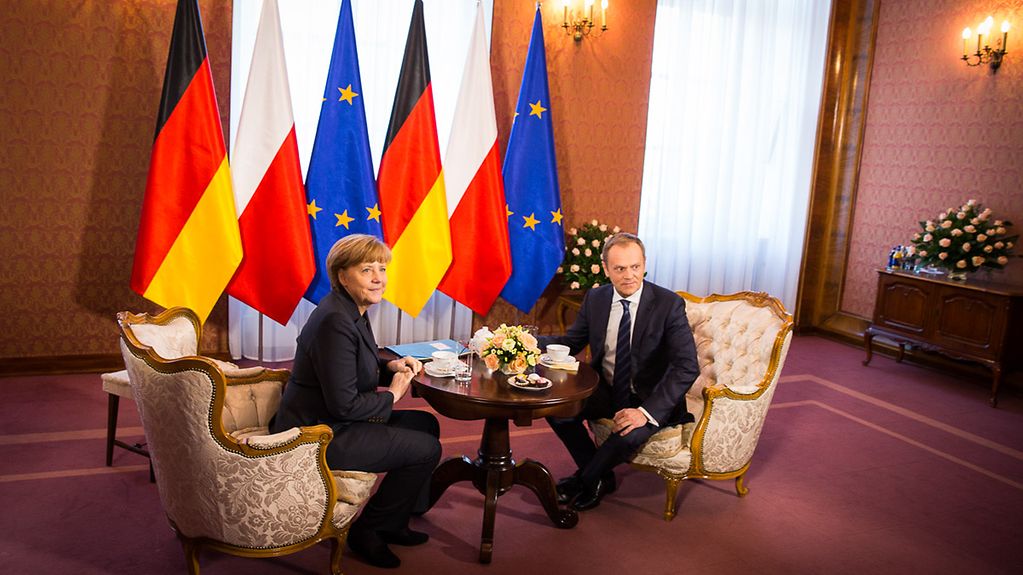Germany/Poland
In the Crimean crisis it is absolutely crucial that the EU demonstrate unity and that the member states act in concert, stressed Chancellor Angela Merkel and Polish Prime Minister Donald Tusk in Warsaw. Their talks were dominated by concerns over the situation in Ukraine.

Resolving conflict with joint action
Photo: Bundesregierung/Kugler
The current situation, especially in Crimea, was the main item on the agenda of the cordial and in-depth meeting of the two heads of government. Angela Merkel reported that she agrees completely with Prime Minister Donald Tusk in his assessment that this is an extremely serious conflict within Europe. They discussed joint strategies and possible solutions.
Strategies for dealing with the crisis
Angela Merkel listed three main thrusts of action: assistance for Ukraine, the willingness to enter into talks, and – should negotiations fail to bring about a solution - sanctions.
To support Ukraine, the political chapters of the Association Agreement with the EU are to be signed rapidly, possibly at the next meeting of the European Council on 20 and 21 March. In this context, Angela Merkel welcomed the fact that the European Commission is looking to ease trade restrictions on products imported from Ukraine.
With a view to establishing a contact group, much has been attempted to facilitate talks between Russia, the USA and the European Union, noted the Chancellor. It must, however, be said that no progress has been made. The logical consequence is that preparations must now begin for a second phase of sanctions.
De-escalation is still the goal
"We obviously hope for de-escalation," said Angela Merkel. If this fails to materialise, though, which we must expect at this moment in time, the EU foreign ministers will implement the first decisions when they meet on Monday. The topic will also be on the agenda of the coming European Council meeting.
"I think we are going to need stamina here," underscored the Chancellor. The conflict can only be resolved with unified European action. Military action is not an option in the 21st century. The Chancellor did, however, state quite clearly, "We are not going to sidestep conflicts".
Sanctions under consideration
We will be seeking discussion and negotiation, said Angela Merkel, but at the same time, "We will not only be thinking about sanctions, but considering carefully the various stages". The EU has already decided on this course of action should the situation escalate.
Discussion and negotiation are the way to solve problems, she said. It must, however, be noted that this has not worked as we had hoped. The EU has taken precautions, and if necessary "it will have to go ahead with the second stage".
The action will involve freezing the assets of certain groups and imposing travel bans. The technical preparations are already underway. The EU foreign ministers will state clearly at their meeting on Monday "who will be affected" announced the Chancellor.
The G7 states also reserve the right to express their position on the Crimean crisis. Donald Tusk added that the Euro-Atlantic union is the key to the success of all future activities.
For secure energy supplies in Europe
Energy policy was another focus of the talks against the backdrop of the next European Council meeting. The Chancellor urged greater unity on this issue. Progress has been made to the extent that connectivity has been improved among member states, said Angela Merkel. "But there can be no doubt that there is still much to do."
The Chancellor was pleased that an ambitious working programme in the field of climate change mitigation is to be implemented with Poland by the end of the year. Although the situation in the two countries is quite different, both have learned to deal with this, she said. "I believe that Germany and Poland can act together here," declared the Chancellor.
Prime Minister Donald Tusk had proposed joint energy imports. To this end the companies involved must come together around the table.
Cordial bilateral relations
The two heads of government had found joint positions on all problems currently on the table, reported Angela Merkel. This reflects the excellent relations that Germany and Poland enjoy.
The Chancellor’s trip to Warsaw, originally planned for 8 January, had to be postponed as a result of her skiing accident. The delay only made her appreciate the visit all the more, said Angela Merkel.
Angela Merkel last met her Polish opposite number on 31 January 2014 in Berlin. Even then the situation in Ukraine was at the top of the agenda.
German-Polish relations were long overshadowed by historical factors, but since 1989 they have become consistently closer, as can be seen by the extent to which their economies are interlinked and the large number of cultural projects. Their broadly similar interests are also reflected in their partnerships within the EU and NATO. Sine 1997 annual government consultations have been held.